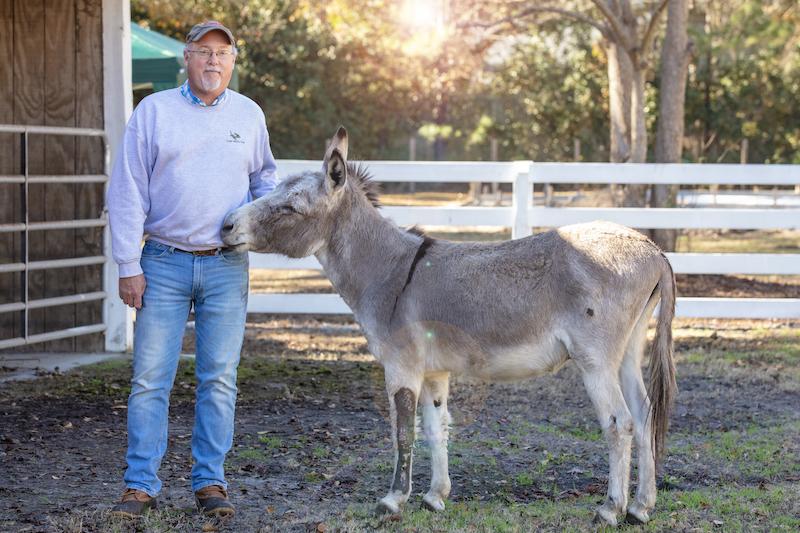- Ziggy
- Rome
- Rex
Imagine for a moment that you are the family dog. One day, the people you love load you up in the car and drop you off in an unfamiliar place where you are put in a cage and surrounded by people and other animals you don’t know. You wait for your favorite humans to come back, but they never do, leaving you with a single question: Why?
Maybe you misbehaved or had a potty accident in the house. Perhaps your parents are moving to a new house where you’re not allowed; your best friend is going off to college, joining the military or traveling; there is a new human in the family; your person is busy with his job and simply doesn’t have time for you, or their new boyfriend/girlfriend is allergic to you. Or … maybe you’re just too old.
You don’t understand. You are heartbroken, homesick, and left to grieve for a life you once knew. Your only hope is that someone else will come along and love you again. But what if they don’t?
This is the unfortunate reality for more than 60,000 dogs and cats who are either abandoned or turned in to county animal shelters in South Carolina each year. In the United States, approximately 6.5 million cats and dogs enter animal shelters each year with relinquishment (i.e., surrender) of family pets a major contributor to shelter intake, according to the American Society for the Prevention of Cruelty to Animals.
Franny Gerthoffer, executive director at Hilton Head Humane Association, is already reporting an increasing number of surrenders this year, many of them older dogs. “I’m not quite sure all the reasons why people are doing this, but if they would allow us to have a longer conversation with them, we might be able to assist them with their aging pets,” she said. “Unfortunately, the animals have become so disposable that they don’t give you an opportunity to have a conversation.”
Some people surrender pets because they don’t feel that they have time for them. “What they may not understand is that animals in a crowded kennel situation may not be getting as much attention as they are getting at home,” Gerthoffer pointed out. “Not that we don’t do our best. I think sometimes the mindset is that people think they are not giving them quality of life. But if you compare it to something that is so unknown to them … it doesn’t make sense for them to live out the remainder of their life in a place where they don’t know anyone or anything or where they are.”
- Lexi
- George
- Munchkin
Fred Wallace, local entrepreneur and owner of Camp Green Dog, is also disheartened by the number of animals he sees being relinquished. “It’s not fair that you adopt a dog for six or seven years, giving it this treasured life, and then you just rip it all away because they became a burden. We see it. And whenever we have a sluggish economy, we see even more of it. My business is boarding, grooming, and daycare. But I get people all the time coming to me saying, ‘I need to find a home for [my pet].’
“Animals love you unconditionally. That’s the only thing they can do for you. And they rely on you to take them all the way to the end of their life,” Wallace continued. “Because they peed on the carpet or they’ve become inconvenient, it doesn’t mean you put them up for adoption when they’re 12 years old.”
Gerthoffer understands that there are circumstances where it becomes financially impossible for a pet owner to continue the care of an older animal, but she has a solution for that. “We can offer financial aid so that the animal can remain for the rest of its life at home—the home that it knows,” she explained. “Sometimes they are giving them up but also putting the burden of expensive medical issues on overcrowded shelters. We have the means to take care of them, and that’s exactly what we’ll do. But we also have the means to help you take care of them.”
Many people don’t understand that shelters do more than just take in homeless or unwanted animals. For example, animal rescue organizations and community shelters such as Hilton Head Humane often partner with other agencies and providers to offer dog training, vaccinations, pet supplies, and general wellness care.
“When it’s an older animal, most of what they do all day is sleep. We can provide big crates they can stay in while you’re gone, and we can provide them with comforts like beds,” Gerthoffer said.
Whatever challenge you are facing, surrendering the pet should be a last resort. “We try to give people options and information to help solve whatever problem is causing them to feel like they need to get rid of their pet. You have to get over your guilt or embarrassment so that maybe something can be worked out. Surely you want to keep your animal, so let us help you do that,” Gerthoffer implored.
- Fergie
- Delilah
Be the change, make the right choice
When you rescue or adopt an animal, you accept responsibility for the health and welfare of another living being. You’re making a promise to care for your pet for his/her entire life. Avoiding a future surrender situation starts with choosing the right pet, and that begins with some thoughtful consideration about where you are in life in relation to the expected lifespan of the animal.
“People are not paying attention to the different stages and challenges in their own life or the different stages in an animal’s life,” Gerthoffer said. “I think everyone should have an animal if they want one, regardless of how old they are, but should be realistic in their decision.”
By the same token, if you are 16, you might need to think about the changes you may encounter over the next 10 years, e.g., college, apartment living, career moves, courtship, marriage, children, etc. What will happen to your pet along the way? Choose wisely or ask the experts to help you find a good match for what may lie ahead.
Another important consideration is financial. When you take on a pet, you commit to taking care of them financially for life. And, of course, the longer a pet lives, the larger the investment. Costs to consider include initial adoption fees and health services, food, housing/shelter, bedding, toys, accessories such as leashes or litter boxes and carriers, routine veterinary care, training, grooming, pet sitting/boarding, etc. Make sure you can afford the animal you choose and budget accordingly.
- Moose
- Bullet
“I’ve seen the mistakes people make,” Wallace said. “I see people who adopt dogs for the wrong reasons. I see people get the wrong size dog or the wrong type of dog, or the timing’s wrong. Animals are defenseless. They completely rely on us to make their lives better. It’s great to rescue, but the biggest thing is knowing what you’re signing up for and what you’ve committed to.”
Hilton Head Humane Association is a 501(c)(3) nonprofit organization funded entirely by private donations, bequests, membership dues, and fundraising. To adopt an animal, donate, or volunteer, visit hhhumane.org. Pet owners in need of daycare, boarding, or grooming can learn more about Camp Green Dog at campgreendog.com.

Judy
*Average Life Expectancy of Pets
The animal’s care, breed, diet, and lifestyle make all the difference.
Small dog (under 20 lbs.) 13 years
Medium dog (20-89 lbs.) 11 years
Large dog (over 90 lbs.) 8 years
Cat (indoor only) 12-18 years
Cat (outdoor) 2-5 years
Rabbit 7-10 years
Hamster 2-3 years
Guinea Pig 4-8 years
Parakeet 5-8 years
Cockatiel 16-25 years
Large Parrot Macaw – 50 years
Cockatoo – 65 years
Goldfish 5-10 years
Snake 15-20 years (ball python—40+ years in captivity.)
Ferret 5-9 years
Turtle/Tortoise 40-50 years (oldest tortoise on record lived 225 years)
Horse or Pony 25-33 years (oldest horse ever recorded was 62 years old)
*Source: pethelpful.com

10 Years Later, Waffles the Donkey Still Kickin’
About 10 years ago, Fred Wallace (Camp Green Dog owner) got an unusual call. Apparently, some young boys thought it might be fun to tie the family donkey to a four-wheeler and drag it down the road. As you might imagine, the animal’s injuries were horrific, with skin ripped off down to his bones.
Animal Control confiscated the donkey, but they had nowhere for him to go. That’s when Tallulah Trice, director of Beaufort County Animal Services and Control thought of Wallace, a well-known animal advocate who could possibly accommodate the donkey on his land. Wallace, who at that time had nine dogs, three cats and a couple of quarter horses, was out of town but agreed without hesitation to take him.
“He was just terrified,” Wallace said. “They managed to get him off the trailer and tie him to a post until I could get home. It took me two and a half hours to get him 50 feet out into the pasture.
Next came the long road to recovery. According to Wallace, it took about nine months to stabilize his legs and get the wounds closed and a long time to gain his trust and get him back to good health. “If you meet him, he’s the sweetest little boy. You wonder, how could anybody do that?”
Today, the donkey known as Waffles, named after Eddie Murphy’s Shrek character, Donkey (“In the morning, I’m making waffles”), lives the life of a celebrity. “All the kids and neighbors love him,” Wallace said.
Donkeys live a long time—35-40 years. Waffles was estimated to be 12 when he was rescued, making him 22 now. Wallace is in for the long haul. “The biggest thing is the commitment,” he said. “Whether it’s a dog, a cat or a donkey, it’s a lifetime commitment.”

Allen
Looking for Love?
Find it at Hilton Head Humane’s Valentine fundraiser, Feb. 11
Mark your calendars for Hilton Head Humane’s Valentine fundraiser. This dog friendly event will be held from 10 a.m. to noon on February 11 at Shelter Cove Community Park on Hilton Head Island.
Ever-popular DJ Alan Palchak will be mixing your favorite tunes while you mingle with friends (and their best friends). Meanwhile, you’ll get to meet some of the shelter’s most eligible adoptable pets, commune with a few farm animals, act silly in the photo booth, bid on your favorite auction items, and try your luck in the cake walk and other fun carnival games.
Sponsored by Heritage Fine Jewelry, admission is free, with other proceeds benefiting Hilton Head Human Association.
- Snickers
- Juice
Pick me!
If you’re ready to adopt a new furry friend, don’t overlook the seniors. While their younger counterparts are adorable, older pets are just as loving and just as eager to become part of your family. While there are many advantages to adopting an older animal, here are four undeniable perks of opening your home to a senior pet:
- Fewer surprises. Senior pets in the shelter often come from another home. People surrendering their pets may provide insight about the pet’s personality, health, grooming, and other needs. With this information in mind, adoption counselors can work with you to determine if your lifestyle and family are a good fit for the animal.
- Advance training. It’s a good chance that an older pet already has some training that will make bringing him or her into your home easier. Senior dogs and cats are typically already house trained, which can make life less messy. They often know basic commands, and they’ve learned good manners, too, like not to chew on your shoes or scratch on the furniture.
- Instant companionship. Since many senior pets have already lived in a home, they are socialized and ready to bond with you. Socialized pets often do better with children, too.
- The trickle-down effect. When you adopt a senior pet, you are giving a deserving pet a second chance at a happy life. Not only will you be saving a senior pet in need, but you’ll be freeing up space in the shelter for another animal looking for love.















